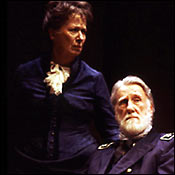
Ah, the blessing and curse of an overactive imagination, not merely teeming but positively unbridled. This is what John Guare has, and rarely a way of reining it in. Take his latest, A Few Stout Individuals, which derives its title from Emerson’s dictum that history is “no more than the biographies of a few stout individuals” (Emerson actually calls them a few “stout and earnest persons”). An interesting idea, even if it does not perspicuously apply to Guare’s play, which concerns not the exploits of a handful of heroes but the difficulties of getting Ulysses S. Grant to finish writing his memoirs before the cancer in his throat finished him off.
We have here Samuel Clemens, a.k.a. Mark Twain, trying, qua publisher, to extract an important historical document from the dying and rambling Grant. In this he is aided or obstructed by Mrs. Grant (by that time quite stout, though played by Polly Holliday, who distinctly is not); Grant’s secretary and rival historian, Adam Badeau; two Grant sons (the prodigal Buck and slightly better Fred); the snobbish Grant daughter, Nell; and Grant’s former soldier and current valet, Harrison, who is black.
Out of such help and hindrances, a lesser but more disciplined dramatist could have fashioned a perfectly actable play. Not good enough for Guare, however: He must bring in the phantoms of the young Emperor and Empress of Japan, who had granted the traveling Grants their hospitality; also the famous opera diva Adelina Patti, fawning and warbling; and a salesman hawking a hair-growing tonic. Annoyingly, the Japanese ghosts converse with the living people, who, except for Grant, are unable to hear them and say some of the same things immediately after the phantoms, creating a running – and ruinous – echo.
There are some pawky and pointed lines of dialogue, and some arresting visual effects as the Grants’ financial problems, their family tribulations, disquisitions about Clemens’s writing, bloody battle memories by Harrison, contrastings of American and Japanese ways, Patti’s song interludes, etc., etc., cluster, some more, some less appropriately, around the central problem. There is an uneasy sense of Guare’s having bitten off more than he or we can chew, and Grant and the Emperor’s mutual-admiration society, after the nth repetition that they are the two most powerful men in the world, requires stout stomachs from the audience.
Michael Greif’s turbulent staging is doubtless what Guare calls for; Allen Moyer’s set, Gabriel Berry’s costumes, Jim Vermeulen’s lighting, and David Van Tieghem’s music contribute handsomely. The acting is consistently competent, with Donald Moffat dutifully imploding as the largely speech-bereft Grant, William Sadler offering an amusingly exasperated Clemens, and only Amy Hohn more irritating than Nell Grant need be.
What Guare should especially resist is cheap gags such as a sculptor’s wishing to show off his bust of Grant and sticking his person or head in from next door every few minutes to ask “Is it time?” only to be chased out by Clemens’s “Not yet.” Would that Guare’s latter-day attempts at matching his early successes did not elicit a similar response from us.
The Kennedy Center’s Sondheim celebration, comprising six Stephen Sondheim revivals this spring and summer, opened auspiciously with Sweeney Todd. The director, Christopher Ashley, sagely refrains from trying to rethink what could best be left alone, and offers a faithful but not slavish re-creation of the original 1979 production. This is immediately apparent from Derek McLane’s scenery, which in a slightly less grandiose but every bit as atmospheric way recaptures the effect of Eugene Lee’s at once massive and threatening Industrial Age prototype. And Howell Binkley’s lights, with their hell-fire reds and poisonous greens, their lavish but not profligate spotlighting, achieve a complementary excitement.
Sweeney Todd itself is, like Porgy and Bess, one of those rare works equally at home in a Broadway-style theater and an opera house. The music is complex and demanding, and, as artfully orchestrated by Jonathan Tunick, improves with repeated hearing and habituation to its sophisticated procedures. The presence of what might be called Sondheimisms in the music, with its characteristically ingenious lyrics, is perfectly appropriate; every composer of note has hallmarks or thumbprints bespeaking his distinctive personality.
Most impressive among the generally irreproachable casting is Brian Stokes Mitchell in the title role. He has steadily grown over the years, reaching his apogee in the Encores! Carnival, and accruing corroborative luster as the Demon Barber. His Sweeney is arresting, ominous, darkly humorous, and scary in just the right proportions, and, in the end, thoroughly moving. The wonderful Christine Baranski gets all the comedy out of Mrs. Lovett but has yet to grow into the maternal aspect of the character, which she surely will. There is fine work from Hugh Panaro (Anthony) and Celia Keenan-Bolger (Johanna), and sundry others. Although good, Walter Charles lacks the creepiness of the original Judge Turpin, Edmund Lyndeck, and Mary Beth Peil cannot quite equal the ravaged craziness of Merle Louise’s original Beggar Woman.
The large ensemble and the solid orchestra, under Larry Blank’s baton, function meticulously (although some initial imbalance in the sound on opening night took a while to be ironed out). The beauty of it all is that neither a limited budget nor a skimpy rehearsal period detracted a jot from the occasion’s powerful and memorable impact.
A Few Stout Individuals
By John Guare, staged by Michael Greif.
Sweeney Todd
Revival of the Stephen Sondheim–Hugh Wheeler musical at the Kennedy Center.